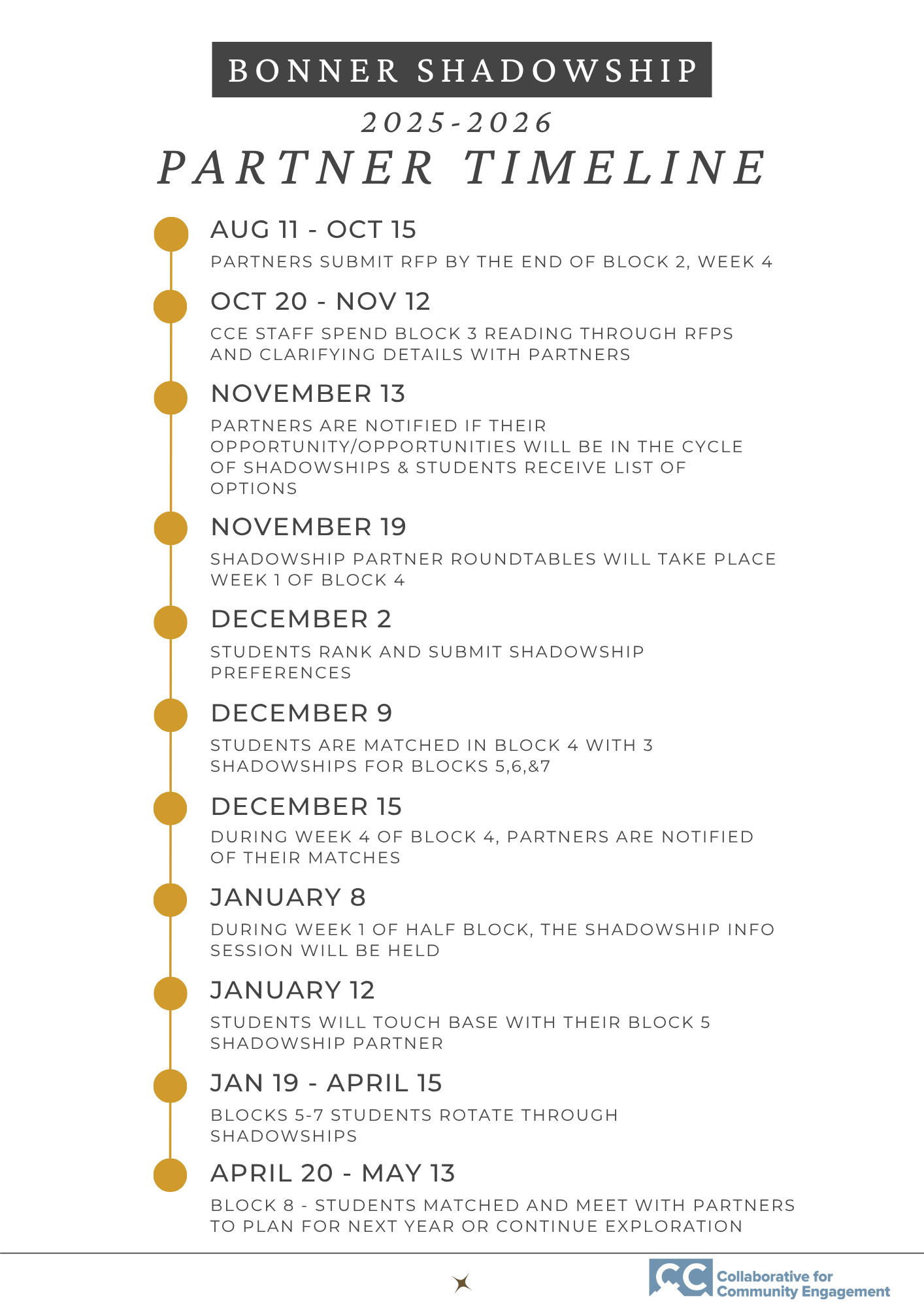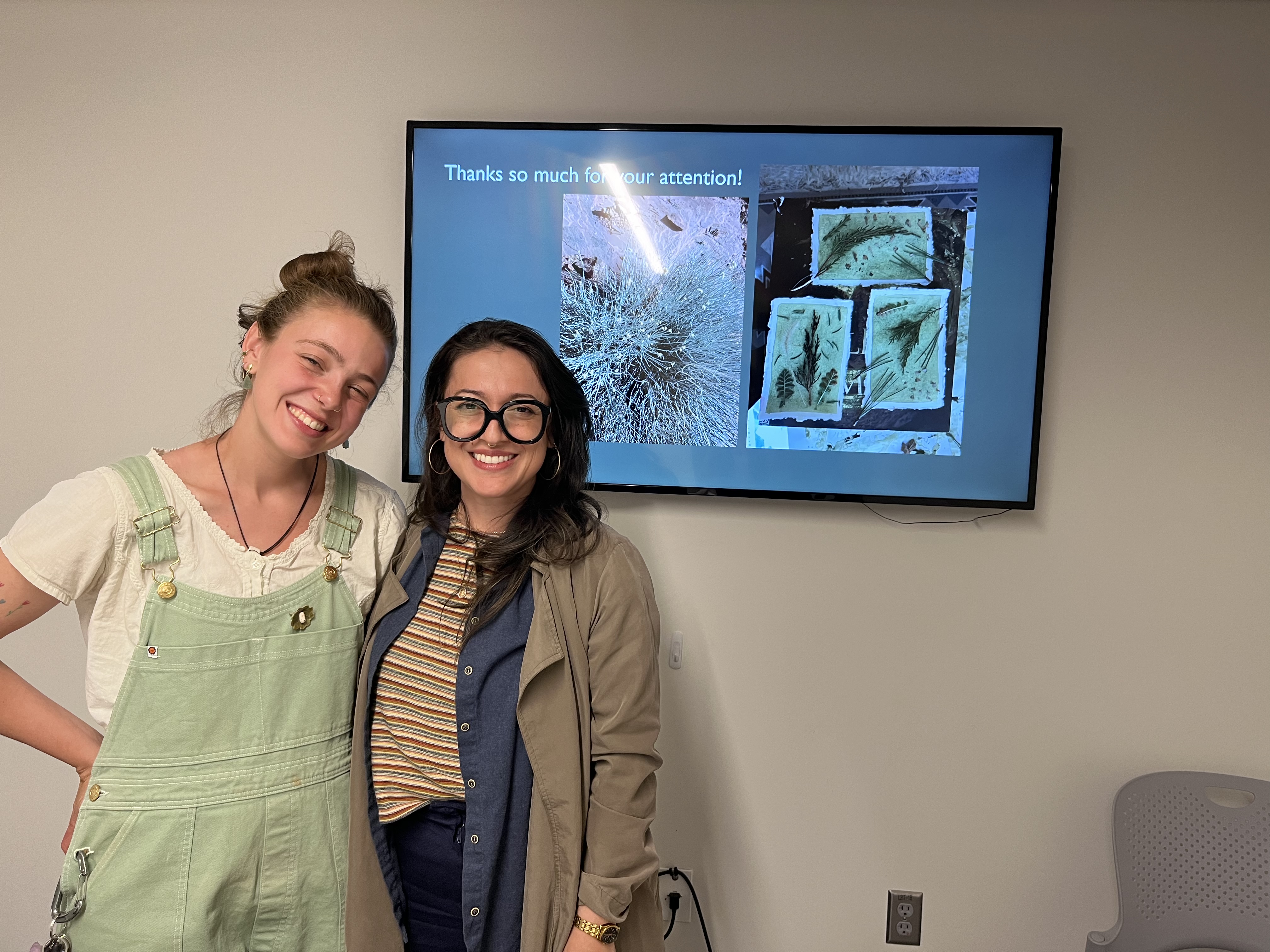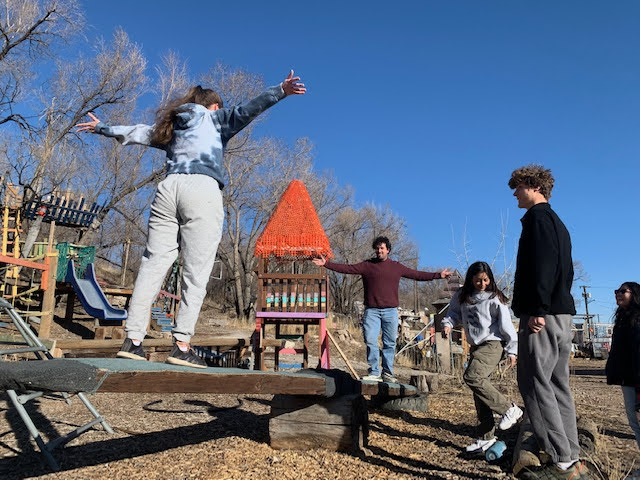Host a Bonner Fellow - Shadowship Process
Interested in long-term work with a CC student?
Our Bonner Fellowship is a great way to connect to students doing long-term, sustained, capacity building work with community organizations.
Getting Started
The Bonner Fellowship is a developmental, cohort based, paid civic leadership fellowship. Community Partners are invited to take part in our Bonner Fellow’s first year exploration through our Bonner “shadowships”. The Bonner shadowship rotation is the practicum component for our first year Bonner Fellows as they explore and seek to identify a community organization they would like to engage with long term.
These internships are geared to expose our students to your organization, its mission, and its work. Shadowships should ideally be structured as opportunities Fellows could engage with over a 3-week time period totaling 15 hours. Students will rotate through 3 shadowships total over the course of the Spring semester (January - April). By the end of their first year, Fellows should have an identified community partner that they plan to work with in the following year.
About the Bonner Fellowship
Fellows work around 24 hours a block, combining direct work with community partners with participation in Fellowship programming. The fellowship is called “Bonner” because we follow the cohort-based model developed by the Bonner Foundation in Princeton and refined over 25 years at more than 70 institutions. The fellowship has three core pillars: (1) community engagement, (2) learning and reflection, and (3) community-building with peers.
*Fellowships are paid through community-based work study & CCE secured funding

show all / hide all
Pillars of the Bonner Fellowship
Community Engagement
 Fellows will engage in work that is guided by and in collaboration with an off-campus community partner, and benefits communities beyond the campus.
Fellows will engage in work that is guided by and in collaboration with an off-campus community partner, and benefits communities beyond the campus.
Learning & Reflection
Fellows will learn about topics or concepts that relate to their community engagement work or the broader field of community engagement. Fellows will regularly reflect on their community work through cohort-based workshops and written reflections.
Peer Community Building
 Fellows will build community with other fellows by sharing in the work that they are doing, providing regular support to one another, and getting to know one another in hopes that their Bonner experience will feel like a collective experience with other students who are passionate about changemaking.
Fellows will build community with other fellows by sharing in the work that they are doing, providing regular support to one another, and getting to know one another in hopes that their Bonner experience will feel like a collective experience with other students who are passionate about changemaking.
Submit a Shadowship Proposal
If you are interested in hosting an opportunity for a Fellow for the Spring of 2026, submit a proposal below by October 15, 2025.
Frequently Asked Questions
Colorado College operates on the “Block Plan." Students take one class at a time over 3.5 weeks, and during this time students enter a certain rhythm with their courses - class from 9 AM to 12 PM (usually) and possibly lab or discussion in the afternoon. The rest of the day students have free time to do their homework, as well as other activities and extra-curriculars. Different blocks require unique time commitments. In between blocks, students have 2 days off – always a Thursday and Friday – called “block break.” Additionally, because students only take one class at a time, professors often take students on field trips that range from a few days to multiple weeks. We ask that you keep this schedule in mind when deciding if you would like to apply to the program and in designing your fellowship. Communication with your fellow is important as their schedules and availability change on a block-by-block basis.
Read more about the block plan here.
Students can become CC-approved drivers and sign out the CCE car, free of use. PikeRide is available to all students, up to 30 minutes/day free of charge, all students have metro cards, and the Zeb shuttle is accessible for downtown access.
A more robust list of options can be found here on our website.
Colorado College has a high rate of students studying abroad at least once during their time at CC. Between 70-80% of graduates have studied abroad as part of their undergraduate experience. The Block Plan allows students the opportunity to study abroad domestically, internationally or engage in field study programs for a block at a time or more. These opportunities and experiences provide students with a transformative learning experience.
What does this mean for working with CC students? Their engagement with your organization will need to discontinue while they study abroad. They may continue to engage with you on remote project solely on a volunteer basis while they are abroad. Communication is important to plan around their study abroad. This also means they will bring back unique perspectives into their work with you.
Fellows work around 24 hours a block with 20 of those hours being direct work with community partners. Fellows are also paid for participation in Fellowship programming. This means students are available for 6-7 hours/week. The fourth week of each block is finals week and fellows’ availability to work in fourth week may be limited. Communication is important to plan around these weeks.
The Bonner Fellowship program recruits and selects highly qualified students, providing a valuable opportunity for your organization to obtain driven, intelligent Fellows; as well as support in the time-intensive process of recruiting and selecting interns. There are four specific benefits to having a Bonner Fellow: prolonged work, quality of the applicant pool, connections to the CCE and CC community, and meaningful community engagement.
- Prolonged, Consistent Work - To accommodate the rhythm of the block plan, including field trips and fluctuating workloads that can differ by week, students commit to a blockly rather than a weekly hour expectation. This leaves flexibility for students to plan ahead and, in conversation with site supervisors, modify fellowship hours for intense blocks or weeks. Bonner Fellows commit to working with community organizations for a average of 20 hours per academic block (about one month). Students are asked to meet with site supervisors at the beginning of each block and plan scheduling depending on their time availability and the needs of your organization.
- Selection of Colorado College Students - The Bonner Fellowship Program recruits top tier undergraduate students from Colorado College to work in community organizations. Over the past few years, CC’s application process has become more selective. Highly qualified Bonner Fellows will use their abilities and knowledge base to strengthen the goals of your institution. Additionally, due to the nature of the Block Plan, CC students are conditioned to accomplish detail-oriented tasks quickly, cultivate strong skills of concentration, and are able to rapidly adapt to new contexts and learn quickly. Bonner students will apply these skills to accomplish demanding tasks assigned to them with ease and efficiency.
- Deep Campus Connections - While your organization’s primary relationship will be with your Bonner Fellow, through this program you will build deep institutional partnerships to the CCE and Colorado College as a whole. The CCE builds and sustains relationships with your organization, identifying partners and helping design internships, developing students in partnership best practices, engaging partners as co-educators in the small group curriculum, and maintaining relationships throughout student transitions. As your relationship with the CCE deepens, we are confident that additional opportunities to collaborate will arise, and hope that the Bonner program serves as an entry point into a more multifaceted and substantial relationship.
- Meaningful Work - Bonner students build the capacities of organizations and in so doing make meaningful, long-lasting impacts, and organizations build the capacities of students by providing developmental internships where students can contribute at multiple levels. As Fellows commit to anywhere from a year to a potential four years of engagement in your organization (in the ideal model, if this pilot is successful and funding can be secured), they will be able to assist with daily functions as well as contribute to long-standing goals of your institution.
Bonner students are held to the following standards:
- 20 hours work per block with organizations
- Complete any additional training required of the position (this is included in the hour requirement)
- Students must discuss hour availability during their first week of each block, after the syllabus is distributed. This could be an email, phone call, or a short meeting during first week.
- Bringing their assets, strengths, energies, and investment into your organization.
- Provide Opportunities to Complete Meaningful Work - Bonner Fellows are intended to help your organization with tasks that contribute to its mission. An ideal Bonner fellowship would not be limited to a secretarial or clerical role in the organization. While this type of work can be combined with other higher responsibility roles or project-based work during the first year as a starting point, the goal is to provide students the opportunity to meaningfully grow and learn from the position and to apply the skills and knowledge they gain in college. In later years students are expected to take on increasing responsibility in their roles and work up to contributing as a junior employee. In doing so our goal is for our students to be transformed as they egnage in transformative community impact work.
- On-Site Supervision and Mentorship - Bonner Fellows report to an on-site supervisor for assignments and projects provided by your organization. On-site supervisors can be anyone associated with your office to which a Bonner student would report. On-site supervisors are expected to provide training and onboarding, structure and guidance, and ongoing feedback and developmental opportunities to students. We ask that they are present while Bonner students work and have a system for recording and verifying hours in place. In addition to providing support and oversite of the fellow’s work we ask that our community partner supervisors also act as mentors, helping fellows to discern their path and career interests.
- Local Organizations - The CCE seeks to root students’ knowledge and community engaged experiences in the communities, environments, and contexts that we inhabit. In doing so we partner with local organizations in Colorado Springs. Additionally, first year students are not allowed to bring cars to campus due to limited parking space. This can make transportation challenging for students throughout their college careers. The CCE commits to providing transportation to your site for all students who do not have access to cars, and we encourage hybrid or remote work with organizations not within bikeable or walkable distance from the college.
- Capacity to Support a Multi-Year Fellowship Model - The CCE hopes to build more long-term, deeper partnership opportunities for students. We encourage you to develop internship positions with the capacity to grow in responsibilities. We are happy to support you in thinking through a scope of work for a Bonner Fellow.
show all / hide all
